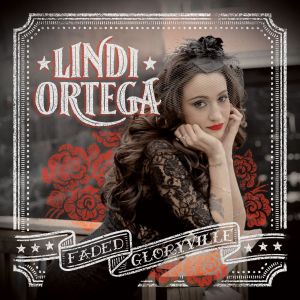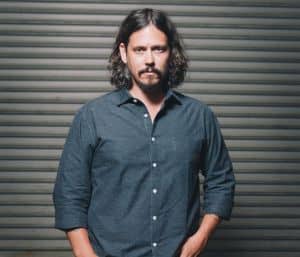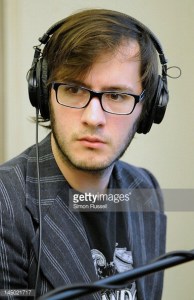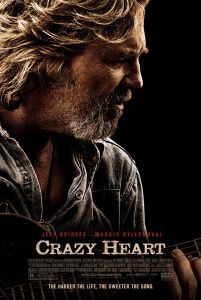Lindi Ortega: Wasting Away In Faded Gloryville (Interview)
Canadian Americana artist Lindi Ortega has just released her new album, Faded Gloryville. For her latest musical offering, Lindi spent some time at the legendary Muscle Shoals recording studio in Alabama, soaking up some of the vibes left there by Southern soul greats such as Wilson Pickett, Aretha Franklin and Etta James. Lindi’s music consists of her own unique combination of country, soul, rockabilly and folk. On Faded Gloryville she enlisted several producers including the team of John Paul White (formerly of The Civil Wars) and Alabama Shakes keyboard wiz Ben Tanner.
The 13th Floor’s Marty Duda spoke to Lindi Ortega while she was on the road in Pennsylvania, trying to drum up interest in her new album. Along with revealing how she got involved in making country music while growing up in Ontario, Lindi also sheds some light on what its like being an up-and-coming musician in an age when virtually no one pays for music, unless its performed live. The result is a life on the road, struggling to make ends meet and a fear of ending up in her own version of Faded Gloryville. But first, Lindi was scheduled to play at last year’s Americana Fest at Auckland’s Tuning Fork, but cancelled at the last minute…so, what happened there?
Click here to listen to the interview with Lindi Ortega:
Or, read a transcription of the interview here:
MD: I’m in Auckland, New Zealand, and I think you almost made it here last year. Am I right?
LO: Yes, and I’m so upset that I didn’t make it there. I was really looking forward to it. It was supposed to be like the highlight of my trip.
MD: We were looking forward to having you so hopefully you’ll be able to make it here some other time because the new album’s sounding pretty good.
LO: Yeah, I don’t know, something weird happened with the visas or something. I don’t know really what went on but it was very disappointing. It was a very last minute thing…anyway, hopefully I’ll get back there and the visas will all work out.
MD: Hopefully that will happen. I know you’ve had a couple of albums out but you’re relatively new to folks here in New Zealand who probably don’t know a lot about you so…I know you’re from Canada and maybe you can tell me a little bit about your musical past growing up and why you’ve chosen to play the music that you do play…why you’re not a hip-hop artist or a rock and roller…
LO: (laughing) I really wanted to be a death-metal artist.
MD: (laughing) There’s still time.
LO: There’s still time. Maybe when I’m older, maybe when I’m 80, I’ll get into death-metal. I started out when I was about 15 or 16 years old and my dad was a bass player in a Latin band and we had this sort of treasure trove of musical instruments in our basement because our dad was the band leader so he had a PA system with a microphone and we had a keyboard and we had guitars and bass guitars and amps and all the things you could possible think of, we had. I used to go downstairs in my basement and play around and that was sort of my first kind of foray into music. And growing up, my mom was a huge fan of people like Kris Kristofferson, Linda Ronstadt, Dolly Parton, Willie Nelson, Johnny Cash and she had a big record collection of all that sort of stuff. And she was also really into The South. She was a huge Civil War buff and she loved Gone With The Wind. We used to do bus trips when I was a kid, like bus tours. We would go to all these sort of Southern plantation homes and stuff like that. So, I think it was through that, it sort of planted a seed in me and I have an appreciation for it quite young. When I started making music, I started do like singer-songwritery stuff. It didn’t quite start getting more country til after my second album that I released myself. The first one, I had one song on it that was country, and then the subsequent record after that had about three songs on it that were country and I just noticed that I was starting to go in that direction. It was feeling like it was really natural. Then I just started making that kind of music.
MD: You’ve played in Nashville recently, right?
LO: Well, I live in Nashville, now. Yep, I’ve lived there for about three and a half years…it’ll be four years in December. I’ve played a few gigs there, I’m playing in September again.
MD: Moving to Nashville, did they embrace you or wonder why this Canadian person is coming to make country music in Nashville?
LO: (giggles) I don’t know. I didn’t really go to Nashville to make it. I went really more because I was interested in the history. I’d been reading a lot of biographies and there were a lot of Hank Williams and Johnny Cash and Patsy Cline and Nashville is mentioned as the Mecca for that style of old classic country that I love. I thought, I’d been living in Toronto for a while and at the time I was living there, whatever you want to call it…alt.country, I guess…wasn’t really a big thing. So I kind of felt like I was spinning my wheels and I needed a change of scenery and I ended up moving over to Nashville. But it really wasn’t a thing where I was trying to get in on a scene or be accepted or anything. I did get some opportunities from living there. My publishing company has an office there so they were able to help set me up with an appearance on Nashville, the TV show.
MD: Oh, right, yes, I watch that.
 LO: So I was on an episode there and they played a few of my songs. But as far as Nashville and it’s sort of accepting or not accepting me, I don’t know. I guess I never really tried. I happen to make music that seems to go over well in some parts there. But if you talk about the machine of Nashville, which is largely what the industry is based on, that sort of new country music, I’m not at all into that world.
LO: So I was on an episode there and they played a few of my songs. But as far as Nashville and it’s sort of accepting or not accepting me, I don’t know. I guess I never really tried. I happen to make music that seems to go over well in some parts there. But if you talk about the machine of Nashville, which is largely what the industry is based on, that sort of new country music, I’m not at all into that world.
MD: It’s quite a way between what you do and say Kacey Musgraves or somebody like that, I guess.
LO: Oh yeah, it’s funny, because I get placed in the category a lot alongside her but, I don’t know, I do do some songs that have a bit of an old school, classic country feel but I have a lot of blues influence and a lot of soul and rockabilly, so I think it’s much more than just country. But a lot of people need a laneway to put it in so they stick it in to that…unless it’s the mainstream, which will refuse to call me country and then I have to be called Americana…even though I’m Canadian.
MD: Right! You mentioned soul music. You do a…I was listening to the new album…you do a very soulful version of To Love Somebody, the Bee Gees song.
LO: Yeah, I love that song.
MD: Were you aware that it was originally written for Otis Redding to sing?
LO: No, I had no idea, actually. That’s new information to me. The first time I ever heard that song was Nina Simone performing it…it was a YouTube clip of her doing it live and I’d never heard of the song before. I know that she’s very famous for doing cover tunes so I had a suspicion that it was written by somebody else and I looked it up and saw that it was The Bee Gees. I liked their version too, it was quite different. There were two very different versions of it so I found that very fascinating that a song could take on such a different feel when sung by such an emotive woman. But I love the song.
Listen to Lindi Ortega’s version of To Love Somebody here:
MD: I believe I read somewhere that Barry Gibb of The Bee Gees did, indeed, write it with the idea of offering it to Otis Redding to sing and of course he recorded in Muscle Shoals and in Memphis and all that which is where the new album has been recorded. Hopefully you can tell me about your trek down to Muscle Shoals and what that was like.
LO: Yeah, that was very cool. We did three songs on my record at Muscle Shoals and it was really interesting because somebody told me about the Muscle Shoals documentary and I was watching it while I was there and while I was recording the songs. It was kind of this really surreal experience and we ended up having a legendary bass player, who was in the Muscle Shoals documentary, play on three of the songs. His name is David Hood, and that was really cool, too. And getting to work with John Paul White and Ben Tanner was a dream, they’re two very talented people who work really well together. It was really interesting because I’d only really worked with one producer at a time, I’d never worked with a duo, that was a really cool experience. I really liked it.

MD: How did they divvy up whatever it was that they did? Who did that work with you because obviously it’s a different dynamic working with three people than with two?
LO: I would say they were equal parts involved in everything and they each had a hand in playing instruments as well. Ben plays a lot of keys parts on it. He has really great ideas as far as string arrangements and horn arrangements and stuff like that. I saw them both behind the board a couple times so I think they both did the same job but they just took turns at it. It was really cool. It was very different than what I’m used to. I recorded at their studio which is a studio I think they called it Sundrop Studios and it’s a converted bungalow that they’ve made into a studio. It hasn’t really been used by anyone else, just me and I think another artist they’ve worked with. It was interesting to be part of this new venture that they were doing as well.
MD: How did you get hooked up with them? Ben plays with Alabama Shakes and of course John Paul is from Civil Wars. Are they folks you’ve run into over the course of your career?

LO: I met John Paul a few years ago, actually. I was looking to write songs and my manager knew his manager and asked if he’d be willing to co-write some tunes with me. The first time I ever went down to Alabama I actually went to the Fame Studios and sat with John Paul White and wrote songs in Fame Studios, which is really cool. And then a couple of years later I start to do this record and realize that I need some more songs for it and I went down to go write with him again and we wrote Someday Soon together and it was at his studio. It wasn’t at the Fame Studio, it was at his studio and that’s when I emailed my manager and I said, ‘You know, John Paul White’s got a studio here. I’m not sure if he’s recording people but we’re making a record and it might be cool to do something’. So he called them up and he agreed to record three songs for me, which is awesome. And I just wanted to add that it was through John Paul White that I met Ben Tanner. I didn’t know Ben Tanner beforehand. And he’s a wonderful person as well.
MD: I read somewhere that the whole Faded Gloryville thing is inspired by the Crazy Heart film.
LO: Yes!
MD: Maybe you can elaborate on that a little bit for me.
 LO: I just was watching the movie one night and I think when you watch that movie as a musician you sort of interpret it a little bit differently than somebody who’s not a musician. That whole scene…the opening scene…where he’s playing the bowling alley, he’s down on his luck and he can’t get ten dollars and they won’t give him a free beer…you know, he ends up puking out the back stage door…very poignant. You know, I had a moment where I legitimately asked myself, ‘Could that be me? Could I end up like that?’ And you don’t know…I think in this business, unless you get signed at nineteen and you have a chart topping hit right away, like you just don’t know how things are gonna go. And so you have moments along the way where you just question it and you wonder if you should keep going or if you should give up, if you’d rather have a retirement fund, job security, paid sick days, whatever. It’s a very difficult business and so I think you do, when you’re out there working…like a working musician who’s out there trying to make something, trying to build a career…you sit there asking yourself if you could end up like that. I find that gauging success in terms of the route that I take is a little harder because it doesn’t come in a big wave. It’s a very sort of slow climb. So it’s not like I have a radio hit to gauge something on or like a television appearance on Letterman or whatever. So I have very little, small steps that I take to help build things along the way. Unless you sit down and reflect and take some serious time to that, which is hard when you’re on the road all the time, you don’t know. It’s hard to see where things are going and how they’re going and what’s happening and so you sometimes have these moments where you just doubt yourself. I figured that a lot of people that are in my position feel that way at some point. It’s kind of like a state of mind but I sort of refer to it as a place called Faded Gloryville where you start off with these really big dreams and ideals of what you think you’re gonna be as a musician and then the reality hits and it’s not that at all.
LO: I just was watching the movie one night and I think when you watch that movie as a musician you sort of interpret it a little bit differently than somebody who’s not a musician. That whole scene…the opening scene…where he’s playing the bowling alley, he’s down on his luck and he can’t get ten dollars and they won’t give him a free beer…you know, he ends up puking out the back stage door…very poignant. You know, I had a moment where I legitimately asked myself, ‘Could that be me? Could I end up like that?’ And you don’t know…I think in this business, unless you get signed at nineteen and you have a chart topping hit right away, like you just don’t know how things are gonna go. And so you have moments along the way where you just question it and you wonder if you should keep going or if you should give up, if you’d rather have a retirement fund, job security, paid sick days, whatever. It’s a very difficult business and so I think you do, when you’re out there working…like a working musician who’s out there trying to make something, trying to build a career…you sit there asking yourself if you could end up like that. I find that gauging success in terms of the route that I take is a little harder because it doesn’t come in a big wave. It’s a very sort of slow climb. So it’s not like I have a radio hit to gauge something on or like a television appearance on Letterman or whatever. So I have very little, small steps that I take to help build things along the way. Unless you sit down and reflect and take some serious time to that, which is hard when you’re on the road all the time, you don’t know. It’s hard to see where things are going and how they’re going and what’s happening and so you sometimes have these moments where you just doubt yourself. I figured that a lot of people that are in my position feel that way at some point. It’s kind of like a state of mind but I sort of refer to it as a place called Faded Gloryville where you start off with these really big dreams and ideals of what you think you’re gonna be as a musician and then the reality hits and it’s not that at all.
MD: Of course, music history is littered with folks who had big hits when they were nineteen and then they were washed up by the time they were 25, whereas you have someone like Jason Isbell who has had a long-ish build up and chances are he’s going to be around doing his thing 20 years from now because he’s got this legacy and this catalogue building up that isn’t based around just one particular song.
LO: Yeah, absolutely. I guess it can be a blessing in disguise. I guess it’s different for everyone. That’s awesome and it worked out really well for him and he finally did really hit his stride but that’s not to say it’s gonna work out for me. I still don’t know. I still don’t know, I mean like, I’m at a point where I still have moments where I don’t know if I’m going to be able to pay my rent next month. Like, that’s how I survive day to day so…and I might not ever get like, a break, like one of those breaks. It doesn’t necessarily have to be a big break, it just has to be something that, you know, will help me live a little easier, maybe, I don’t know. For now, it works for now. I love music so much and I love performing and its all worth it for now. And maybe I’ll build something that will help me sustain it. But I can’t honestly say right now that’s gonna happen. So, you kind of live in a bit of a…yeah, there’s major ups and downs with it all.
MD: That must weight on you when you’re actually writing the songs and making the records. Is that in the back of your mind….’How am I going to make this be more accessible, or get to more people?’
LO: Yeah, I guess it does. It seems to come out in my music quite a bit. It does, I guess, weigh on me. I think sort of everything influences me. I tour so much so it seems like my job is a lot of who I am at the moment. And I do hope to take a little bit of a step back after this record and just get re-invigorated and re-inspired by different things other than being on the road and working constantly.
MD: Do you talk to other musicians who are like in a similar place? Do you guys share notes and discuss what’s going on business-wise that can take you from one level to another?
LO: Yeah, a little bit, a little bit. The thing is, the business is so…there’s no formula for anything. We all try. We all try to put cool videos on YouTube and reach out through social media and do things differently but it’s hard to say what’s going to take and what’s not going to take. Sometimes it’s just a stroke of luck, isn’t it?
MD: Yeah.
LO: We keep trying. There was a mentor of mine who once said, ‘Just keep putting things out there. As long as you keep putting things out there musically, there is more of a chance that something can come of that. But if you don’t put anything out there, then nothing’s going to come of it’.
- Civil War – Dir: Alex Garland (Film Review) - April 9, 2024
- Pearl Jam – Dark Matter (Monkeywrench/Republic) Album Review - April 1, 2024
- Blonde Redhead – New Zealand Tour 2024 - March 14, 2024
